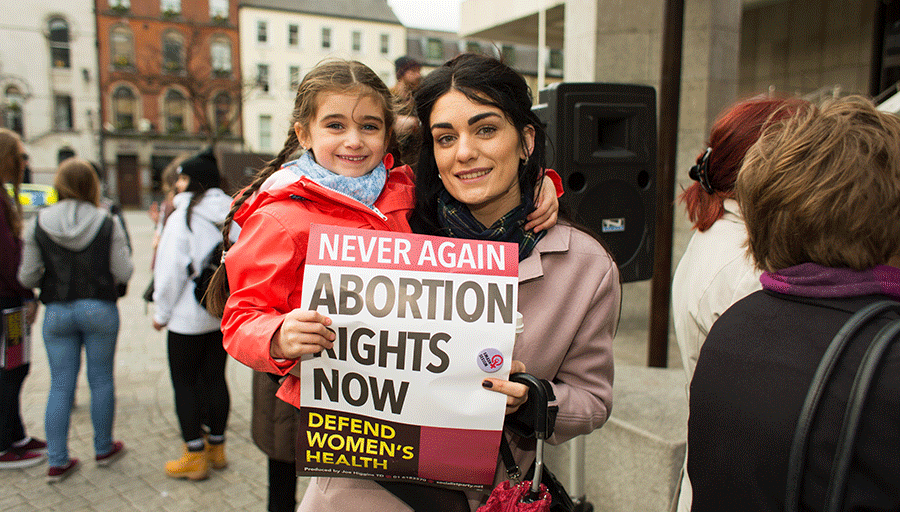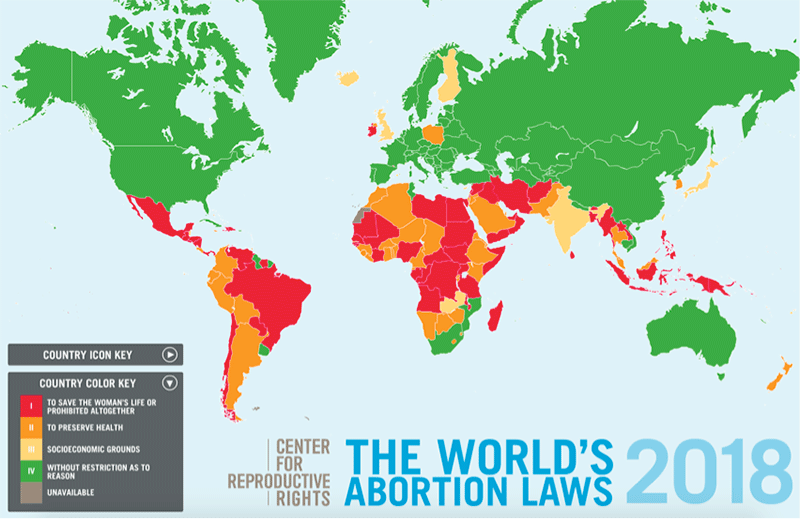This morning a friend sent me a photo of a Belgian newspaper article and I cried. I have been involved in the Irish women’s rights struggle for years, but seeing it covered in a Belgian newspaper, in the language of my adopted country, hit me in a way I didn’t expect. This is for everyone who thinks Ireland is a happy modern European country, full of Guinness and coloured green.
May 25th 2018 will be the long awaited date for a referendum around the 8th amendment to the Irish constitution. Ireland is one of the only countries that has medical restrictions written into the constitution. This means that it can not be removed by the government, but only via a referendum. The question we are being asked is, should this amendment be removed from the constitution?
“The State acknowledges the right to life of the unborn and, with due regard to the equal right to life of the mother, guarantees in its laws to respect, and, as far as practicable, by its laws to defend and vindicate that right.”
Worldwide, only Ireland and the Philippines have provisions which equate the right to life of the unborn with that of the mother.
Today Ireland has one of the most restrictive laws in the whole world in relation to abortion. Abortion was illegal in Ireland in all cases until 1992. That year the Supreme Court declared that, under the 8th amendment, abortion was legal in the case of threat to the life of the mother. However, abortion remained a criminal offence and the legal implications were so unclear that doctors were unlikely to carry out such a procedure.
“Every day 13 Irish women travel to the UK to access abortion services. They travel home, bleeding and alone, on planes and ferries.”
The Protection of Life During Pregnancy Act 2013 brought some clarity, however, criteria to qualify for abortion are very restrictive. The 2013 change came about partly in response to the avoidable death of Savita Halappanavar caused by the restrictive abortion laws. Mrs Halappanavar was 17 weeks pregnant in October 2012 when she was admitted to hospital suffering a miscarriage. In the last seven days of her life she repeatedly requested an abortion for her dying baby. She was told “this is a Catholic country” and her request was denied based on the fact that the foetus still had a heartbeat. By the time her miscarriage came to a natural end four days later and the foetus was removed it was too late to save the mothers life.
It is important to realise that the 8th amendment does not prevent abortion. Every day 13 Irish women travel to the UK to access abortion services. That is over 5000 women per year who leave their support network and home to undergo a medical procedure that their country denies them. In such a time-sensitive situation, those women face weeks of delay while saving to afford the trip. They book their procedure using fake UK addresses for fear of prosecution once back home. They travel home, bleeding and alone, on planes and ferries, 13 every day. Women who develop complications are often too afraid to go to the hospital, with serious consequences. Many order abortion pills on the internet. Often these pills are confiscated by customs, leaving pregnant people desperately considering more drastic solutions. This helpful guide to abortion while living in Ireland, gives you an idea of what is involved. The 8th amendment does not prevent abortion, it only prevents safe abortion.
“The 8th amendment does not prevent abortion, it only prevents safe abortion.”
In September 1983 the 8th amendment was approved by referendum. This means that anyone under the age of 52 today did not vote on this issue. The anti-choice campaign would like you to believe that this referendum is about selfish women choosing to murder babies. They frame it as abortions for everyone, even suggested that if abortion would be legal, that no more babies would be born in Ireland. They stand on the main street of every town, outside schools and hospitals, with posters showing disturbing images of third trimester babies torn apart. Under the Public order act it is illegal to display such images. They do not represent the reality of abortion, but that does not stop them.
They recently ran a campaign featuring a man who claimed to be a Registered nurse and psychiatric nurse. He claimed he had witnessed unethical abortion practices in UK hospital theatres, including seeing “beakers of babies” left on shelves for days following abortions. Thanks to the hard work of @NursepollyRgn (an actual nurse), we now know the truth. Nurse Polly carried out an investigation that proved that his nursing certificate and ID were falsified. This man fled to the UK in the 1990s to avoid criminal charges. He was never a nurse and was not present in hospital theatres. He worked in a hospital as a porter for 8 months in 2000 and his employment then ceased. This gives you a glimpse of how the anti-choice campaign is being run. They use lies to try distract you from the truth.

Save the 8th campaign said that it stood by the adverts despite discovering that Noel Pattern was not honest in his testimony. Source: www.broadsheet.ie
The demographics of the anti-choice movement; men, old women and religious fanatics. This is not the demographic affected by this law. They march with rosary beads, statues of Virgin Mother Mary and placards shouting about murder. The Catholic church has been detrimental for women and children in Ireland. From the paedophile priests to the torture of unmarried mothers, the babies sold to medical trails, starved to death or dumped in septic pits. The Catholic church seems to not love women* and not love children.
This is the same movement that campaigned against the use of contraception. Birth control was not readily available in Ireland until 1992. In 1978 contraception was available for “family planning or for adequate medical reasons” and only on doctor’s prescription. This means, up until 26 years ago, if you were married, you had to ask your doctor for a prescription for a condom. If you were not married, you would not get the prescription. Prior to 1978, it was forbidden to sell or advertise contraception in Ireland. This group also campaigned against divorce, which remained illegal in Ireland until 1996.
“The anti-choice movement uses the slogan ‘Love both’ but do not seem concerned with children once they are born.”
The anti-choice movement uses the slogan ‘Love both’ but do not seem concerned with children once they are born. Of the almost 10,000 people homeless across Ireland, 3,755 of them are children. Almost 500 of those children became homeless in February 2018. If they cared about children, they would be out on the street protesting that. The anti-choice people seem to not love women and not love children.
So, what does the 8th amendment mean?
The 8th amendment of the Irish constitution does not only affect pregnant people seeking abortion. It has tendrils in the medical care of every woman in Ireland. Here are a few of many examples:
-
-
- Pregnant people who become ill cannot receive any treatment that may harm the foetus. There are no exceptions to this rule. If you are pregnant and you get cancer, there is no option to save your life if it puts the foetus at risk.
- If you are undergoing treatment for cancer, you must take a pregnancy test before each session. If you have a positive pregnancy test, your treatment is immediately stopped.
- During pregnancy and labour, a doctor can perform any procedure they deem necessary without your knowledge or permission. (Including sweep, episiotomy, caesarean section, …)
- As a young teenager I went for x-rays due to back problems. Before every x-ray, they would ask me when I had my last period. I never understood why and it stuck with me because I found it humiliating. I now know why they asked. If I would say that I was due my period in the next week, they would reschedule the x-ray. At that point in my cycle, there was a possibility that I could be pregnant without knowing (and without ever having had sex). So at that point, a theoretical, non-existent foetus had the power to delay my medical treatment.
- If a foetus has a fatal abnormality and is incompatible with life, you are forced to carry the pregnancy to term. In a situation where there is no chance the baby will survive the birth, you have no legal choice but to carry the pregnancy to term. This is highly traumatic, knowing each day could be the day your baby dies in your womb. Knowing that if there is even a hint of a heartbeat, doctors have their hands tied and could watch you die too.
- Being forced to continue a pregnancy with a dying foetus puts you at risk of developing sepsis, which is life threatening. This is what killed Savita Halappanavar in 2013.
- Women who are raped and obtain medical abortion pills on the internet can face a longer prison sentence than the rapist.
- If a doctor informs a pregnant person about methods of accessing abortion, they face a prison sentence of 14 years. This includes ordering safe termination medication online or information about traveling to England for the procedure.
- Safe abortion pills are regularly seized by customs coming into Ireland, 6000 over the last ten years. This leaves pregnant people in a desperate position, often forced to consider more dangerous methods of ending their pregnancy.
- If someone dies while pregnant, their body can be kept ‘alive’ on machines so that the foetus can survive, even against the wishes of the family. This happened in 2014 when a woman who was 15 weeks pregnant was kept on life support for 24 days after she was declared brain-dead because her unborn baby still had a heartbeat. Her life-support was turned off after a court case granted the family’s wish that she be allowed to die.
- If a person in need of an abortion goes on hunger strike, they can be force-fed and kept in hospital by court order until a caesarean section can be carried out. In 2014 a woman in her late teens was forced to undergo a Caesarean Section at between 24 and 26 weeks gestation. The pregnancy was the result of a rape. In reaction to being refused an abortion, the woman was actively suicidal and stopped eating and drinking. She was drip-fed under court order until the Caesarean Section could take place.
- People seeking abortion can be held against their wishes in a psychiatric ward. In 2016 a 14 year old girl was subjected to this.
-
What can you do to help?
If you have a vote in this referendum, I urge you to use it. The question is not if you personally approve of abortion, the question is if you believe that women should have the right to choose. If you are anti-abortion, repealing the 8th will have no impact on you, you will never have to get an abortion. I have heard a lot of men saying that they wish to leave it up to women, and so will not be voting. I can assure you that the anti-choice campaigners will not afford us the same courtesy. Voting Yes to repeal the 8th amendment is the only way to give women a choice. As I have been living outside Ireland for longer than 18 months, I have lost my right to vote (I am however auctioning a painting with entire sale price going to Together For Yes – who are coordinating the actions of several pro choice organisations). Please don’t stay at home on the day.
If you are undecided, I suggest going to the fb page ‘In Her Shoes – Women Of The Eighth’ and reading the statements of women who have been affected by the 8th amendment. If you are planning to vote Yes, talk to your friends and family, ensure they have enough information to make an informed decision. Get vocal online, this requires a lot of emotional labour, and you will cry, but you are not alone.
I believe that women should have the right to choose. I hope that right will finally become a reality in Ireland, too. So, does Ireland hate women? On the 25th of May we will have the answer.
Featured photo: via Istock Dublin, Ireland – March 8, 2014: Young mother with her daughter holding together poster regarding abortion rights during International Women’s Day Protest Dublin organised by ROSA organisation
*In this article I use the word ‘woman’ as default. However we should be aware that several non-binary people and trans men are equally affected by this legislation.




5 reacties
Hi All im noob here. Good post! Thx! Love your stories!
Wow. Ik wist dat de Ierse wet fel tegen abortus gekant is, maar niet dat het zo erg is. Ik hoop dat 25 mei verbetering brengt!
En om me dan helemaal te choqueren staan er onder dit artikel 2 negatieve reacties…
Elisabeth,
Ik wil helemaal niet negatief reageren. Ook ik hoop dat de wet op 25 mei veranderd.
Maar het artikel focust op het medische en nauwelijks op het ethische.
En het is juist dàt dat de echte discussie is. (behalve in Ierland waar zelfs dat een issue is!)
Ook al ben ik helemaal voor de mogelijkheid van abortus, toch zijn er ethische bedenkingen die in acht genomen moeten worden.
Als ervaringsdeskundige vind ik het bv niet perse ok dat de vader er absoluut geen zeggenschap in heeft. Ouders zouden als gelijken gezien moeten worden. Maar in dit geval als er over zo iets fundamenteel gekozen moet worden heeft de vader niets te zeggen…
Een andere discussie is tot wanneer het mag.
In België is dat 14 weken, in Nederland en de UK is het na 24 weken.
Na 12 weken heeft een feutus alles van een mens (hart, armen, benen, huid en zelfs haar,….). Een terechte vraag kan dan zijn wanneer een feutus als kind beschouwd kan worden.
Dat zijn vragen die ik me stel en ik geef ook graag toe dat ik daar zelf maar heel erg moeilijk op kan antwoorden. Net daarom zou ik graag een artikel lezen dat daar op in gaat zodat ik er kan van leren.
Ik wou allerminst iemand choqueren door negatief over te komen.
Ik zou zelf zeggen “Go Ireland and repeal the 8th!!!!”
Ik twijfel niet aan de waarheid van dit artikel. Maar dit lijkt me een ethische discussie en geen medische. Nergens zie ik ethische argumenten die pleiten voor abortus. En die zijn er nochtans.
Een jammere gemiste kans.
De echte vragen die niemand kan beantwoorden blijven ongesteld. Tot wanneer is een abortus een zwangerschapsonderbreking? Wanneer wordt het kindermoord?
Heeft de vader zeggenschap?
Moeten artsen verplicht worden dit uit te voeren?
Dat zou pas een echt interessant artikel zijn.
Maar dan moet je die vragen wel durven vragen.
Nu is het een goed opstel maar ook niet meer dan dat…..
So many lies contained in this play-school level rhetoric “article”. Blistering blue barnacles, the adventures of Tin Tin already exists in Belgium – you don’t need any more outrageous tales of pure fantasy.